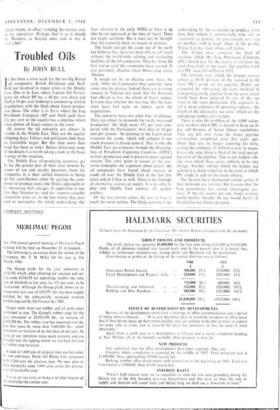Troubled Oils
By JOHN BULL
-1 has been a tense week for the two big British I oil companies, British Petroleum and Shell. Both are involved in major crises in the Middle East. One is in Iran where Iranian Oil Partici- pants (in which BP has a 40 per cent share and Shell a 14 per cent holding) is conducting ticklish negotiations with the Shah about future produc- tion plans. The other is in Syria where the Iraq Petroleum Company (BP and Shell each have 233 per cent of the equity) has a pipeline which takes almost all Iraq's output to the coast.
Of course the oil consortia are always in trouble in the Middle East. They are the regular whipping boys. Editors and politicians find them an irresistible target. But this time more than usual has been at stake. Before discussing some of the details it is worth taking a look at the basic strategy of the situation.
The Middle East oil-producing countries get by far the greater part of their total revenue by means of tax and royalty payments from the companies. It is their settled intention to bump up this contribution either by getting the com- panies to produce more (the Shah's approach) or by increasing their charges. If opposition is met then they threaten to—and do—remove valuable concession areas or, in the last resort, they pro- ceed to nationalise the whole undertaking (the Iran solution in the early 1950s) or blow it up (the Syrian approach at the time of Suez). These are tough sanctions. But it must not be thought that the consortia have no means of defence.
The locals can get the crude out of the earth but hitherto they have not been able to sell much without the world-wide refining and marketing facilities of the oil companies. That has been the best trump card the companies have carried. It was extremely effective when Moussadeq seized Abadan.
It would not be so effective now. Since the early 1950s the Communist bloc countries have come into the picture. Indeed there was a strong rumour in Teheran last week that the Russians had offered to buy the whole of Iran's output. It is not clear whether this was true. But the news must have had quite an impact upon the negotiations.
The consortia have two other lines of defence. They can object to demands for va.aly increased production-- the Shah wants 173 per cent com- pared with the Participants' first offer of 10 per cent per annum--by pointing to the fragile price structure for crude, which will collapse if too much pressure is placed upon it. That is why the Middle East governments formed the Organisa- tion of Petroleum ,Exporting Countries (OPEC) to limit production and to preserve prices against erosion. The other point in favour of the con- sortia underpins the argument about prices: the oil companies have found cheap sources of crude all over the Middle East in the last few years and in Libya as well. There is no shortage of alternative sources of supply. It is possible to play one Middle East country off against another.
Of the two current crises. the one in Iran is much the more serious. The likely outcome is an
undertaking by the companies to produce more than they reckon is commercially wise and an aareement to provide the government, ore way or another, with a larger share of the profits. Where Iran has trod, others will follow.
The Syrian crisis concerns the level of royalties which the Iraq Petroleum Company (IPC) should pay for the transit of oil from the main Iraq fields to the coast. The pipeline itself cost IPC some f-10 million in 1952.
The formula over which the dispute centres reflects a 50-50 division of the notional profit from IPC's profit on the pipeline. Profits are computed by subtracting the costs involved in transporting oil by pipeline from the costs which would have been incurred by use of the sea route to the same destination. The argument it- self is about estimates of operating expenses, the length of the alternative sea route, which are the appropriate tanker rates to take.
There is also the problem of the 4,000 redun- dant workers which IPC is forced to keep on its pay roll because of Syrian labour regulations. They are left over from the major pipeline construction completed some five years ago. There they are, no longer reporting for duty, costing the company £3 million a year in wages. It is a tidy sum, about a third of the total operat- ing costs of the pipeline. That is one hidden sub- sidy over which there seems unlikely to be any change. Another subsidy which the Syrians are seeking is a sharp reduction in the price at which IPC crude is sold to the local refinery.
The Syrians have threatened violent action if their demands are not met. But it seems that the Iraq government has vetoed extravagant ges- tures. If the oil cannot get out, Iraq's revenue would decline sharply. So too would Syria's if the pipeline was blown up again.


































 Previous page
Previous page